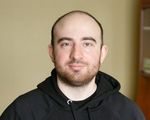About Success Builder
How do you find your place in life? How do you find something to do that both comes naturally to you and makes you happy? The answer is that you have to apply the knowledge you’ve gained from university and from life itself correctly. The Success Builder Project features HSE University graduates who have discovered themselves through an interesting business or an unexpected profession. The protagonists share their experiences and lessons learnt and talk about how they’ve made the most of the opportunities they were given.
Emilia Arslanova holds a bachelor's in sociology and believes that a degree in humanities provides a strong foundation for a successful career in the field of IT. In her role as a product manager at Domclick, she maintains a strong emphasis on professional development in the digital sphere, both as a researcher and a supervisor. In this interview with Success Builder, Emilia shares her insights on how sociology students can make informed decisions about their future career and choose the right employer, why a humanities education is well-suited for managing digital projects, and what prospective students of her upcoming course at HSE can expect.
Sociology may not seem an obvious choice for a university applicant in view of future career prospects. Why did you choose it?
In school, I wasn't particularly good at exact sciences; humanities came more easily to me. Therefore, I opted for social studies and English as part of the Unified State Exam. However, the primary factor in my decision was not the specific field of study, but rather the university itself. I had a strong desire to enrol at HSE because I recognised it to be the top university in the country, renowned both for its education quality and for its exceptional faculty and students.
Despite being well-prepared, I faced a disadvantage as an applicant from a provincial background aspiring to enrol at a Moscow university, compared to candidates who had attended the HSE Lyceum or other specialised schools in Moscow. Before applying, I studied intensively with a tutor, aiming to achieve the highest possible score for admission to a state-funded place, which was my sole chance to secure enrolment at HSE. I applied to several humanities programmes, but I was only accepted into sociology, so my choice was partly incidental, even though it has ultimately had a significant impact on my career and my life as a whole.
What made you think of HSE as the best university?
Drawing from diverse sources of information, such as input from teachers, participants in olympiads, tutors, and online resources, I developed a comprehensive perspective on HSE as a university renowned for providing education at a high international standard and boasting a faculty that includes promising young scholars. Everything at HSE can be characterised as modern, from teaching methods to the campus environment to the currency and relevance of learning. A few students from my school had enrolled at HSE and shared how happy they were and how much they enjoyed the company of outstanding, highly motivated fellow students. I had a wealth of information about graduates and their career tracks, reinforcing my belief in the immense value and demand for such education.
I perceived HSE as the most forward-thinking university, practicing advanced educational technologies and truly modern in all aspects, including academic excellence and career training. Choosing to enrol at HSE was in fact easier than ignoring all the compelling reasons to do so.
Did you find it easy to cope with the new experiences and workload you encountered once you started your studies?
After enrolling, I quickly realised that people had not lied about HSE, with its exceptionally high standards and equally rigorous demands. I could see the calibre of students who enrol here, among them numerous olympiad winners, highly accomplished and driven individuals. When the intensive classes started, I was stressed due to the heavy workload, numerous new subjects, and ranking system that essentially fostered competition among peers. Yet at the same time, all of this electrifies and infuses HSE’s environment with a unique sense of purpose and excitement. Talking to HSE graduates employed in management consulting, I have come to realise that they truly represent the best of the best and cannot but seek to make it to the top of their profession, mirroring their prior university rankings.
Challenges are always a positive thing for an ambitious student
While HSE fosters an atmosphere of healthy competition, students support each other and make sure to maximise their learning in class. The environment itself plays a significant role in one’s development, including personal growth. Indeed, it may be challenging, but later on, in the workplace, you'll find it easy to handle even the most demanding tasks.
I must confess that initially, I had conflicting thoughts, to the extent of contemplating quitting and seeking a university where studying would be easier. However, I received a lot of support and encouragement from my parents and my boyfriend, who convinced me that this was just a challenging phase I needed to overcome. I enrolled in additional classes in several subjects, which also helped me fill the gaps in my previous learning.
Sociology is a rather academic sphere. What helped you complement it with practical knowledge?
Indeed, the programme carries a substantial academic workload. You need to draw upon your entire arsenal of humanities skills, including subjects like philosophy, which are intricately connected to sociology. While it may not directly impact on your subject-specific expertise, it plays a vital role in structuring your thinking and provides valuable tools for effective application in analytics. While studying, one needs to read large volumes of research literature, process extensive datasets, analyse information, draw reasoned conclusions, and compose essays.
What I also appreciate about HSE is that despite the fundamental nature of a bachelor's education, there is an extensive array of practice-oriented courses available within and outside the curriculum, such as data analysis and programming, including the R language which is subsequently used for data processing. There were numerous courses focused on facilitating a successful career launch, which greatly assisted me in securing and successfully completing my first internship. I embarked on it with confidence, aware of the quality of my knowledge.
Why did you opt to enter the industry rather than pursue a master's degree, for instance?
Starting in the second year, representatives from various companies visited our seminars to deliver presentations about their businesses and tasks that specialists could be involved in, and also delivered practical sessions centred on real-life case studies. One of the most common career tracks available to sociology students is employment with marketing research agencies. Nielsen was one of the most renowned agencies in the field at the time, and it's where I eventually secured an internship.
I soon realised that conducting industry research is not abstract theorising, but a captivating endeavour that yields directly applicable results which shape a company's business strategy
This convinced me that in addition to monetising my education, I would engage in stimulating work, establish myself as a professional, and acquire a wealth of new knowledge about the business world. As a first step, I was hired as a junior project manager at Nielsen, where I worked for two years and progressed to the role of full-fledged project leader.
A significant portion of my responsibilities involved research for companies in the FMCG sector, which used the findings to improve their products. Working at Nielsen also provided valuable networking opportunities and helped me strengthen my connections within the professional and business community. I can confidently say that all knowledge and tools I had acquired at HSE proved to be absolutely essential in the workplace. As part of my responsibilities, I administered surveys, negotiated with clients, conducted data-driven research, integrated the results into conclusions, and delivered presentations to customers.
Your current focus lies in the digital sphere. Is this a coincidence or a deliberate choice?
I am convinced that a humanities education is not a hindrance to a career in the IT field. Product development involves a diverse skill set. In addition to programmers, it requires product managers, UX designers, analysts, UX researchers, and copywriters.
Graduates with humanities backgrounds can pursue positions and realise their potential in IT
I would advise graduates who believe their strengths lie in the humanities to consider roles in this field, where they can leverage their abilities while pursuing their desired career path. Product development entails teamwork among various specialists when it comes to managing project implementation and setting objectives. A manager doesn't necessarily need to possess technical programming skills; it's more crucial for them to develop a foundational understanding of the processes involved in product development, which can be acquired through practical experience. Equally important is having a clear vision of how to assign tasks to developers in the right sequence to ensure the product meets its metrics and is user-friendly.
The same applies to the role of researcher. For instance, individuals with a background in sociology can pursue internships with IT companies as UX researchers, where they will analyse digital products and help make them more user-friendly for customers. Currently, as a digital product development specialist, I collaborate closely with colleagues at Sber and share my expertise. For example, I have produced a podcast on A/B testing specifically for product managers at Sber. I have noticed that many sociology researchers begin their careers by joining Sber's IT department. One of the avenues for them to do so is through Sberseasons, an internship programme that enables young professionals to gain first-hand experience of the bank's business objectives and to secure employment. One can effectively pursue a career as a UX research specialist within the product development team or the customer experience department, which is currently led by one of my colleagues from HSE.
As a business researcher, you take responsibility for the entire project, starting with a client’s visit to address a specific problem, followed by conducting surveys, analysing customer feedback, and applying your expertise to find solutions. Given that nearly all businesses incorporate some form of digital service, working in this field is both promising and interesting. At a certain point, work in IT aligned with a need I felt to upgrade my expertise and advance professionally by studying digital products and contributing to their enhancement. The position of a product manager has become a dream job for me—I not only conduct research, but also manage the entire product development process, which helps me expand my expertise.
What are your current responsibilities at Domclick, and what makes you feel at ease working with this specific product?
I initially joined the company in the capacity of a research manager, and taking up this position was a pivotal career move for me. Domclick essentially functions as an IT company, specialising in digital services and the real estate trade. I was drawn to the position, since prior to my arrival, there was no research function in place, nor any division focused on helping the company create better products through data-driven solutions and user feedback. I had to build the research capacity from the ground up, fully leveraging my expertise.
One of the reasons the company entrusted me with this responsibility was the high quality of education I received at HSE, which is a recognised brand in the industry
Once the research framework was established within the company, I was able to expand my role beyond studying the product to enhancing it as a product manager. This position leverages all my skills, demanding not only the ability to navigate the ever-evolving tasks but also a creative approach. Working with a digital product allows me to fully tap into my professional potential.
Product specialists are a little like superheroes, possessing knowledge and skills across a wide spectrum of fields. It is essential to understand the tasks and functions of all departments, from development to marketing, while also holding a comprehensive view of the task at hand and managing the team effectively. To define the task correctly, one must devise a product development strategy rooted in user needs, transforming it into a profitable product for the business. At the same time, one should not forget to cultivate essential personal qualities to a high standard, because working with people requires empathy, sensitivity and engagement, while still maintaining a level of rigor and expectation. In this regard, a product manager's role aligns ideally with the potential of HSE graduates, encompassing both their communication skills and academic aptitude.
When did you make the decision to pursue teaching, and how comfortable do you feel in this role?
It can hardly be described as conventional teaching, because so far, I have mainly communicated our team's expertise to colleagues at Sber, sharing insights from my personal experience and highlighting the tools needed for managing a digital product, particularly for a substantial user base such as Sber’s. I would like to deliver lectures to students, and for this purpose, I participated in the Accelerator recently held by the HSE Graduate School of Business. As a result, in the upcoming academic year, I will be teaching a Digital Product Management course to fourth-year bachelor's students. To be honest, this opportunity makes me both happy and apprehensive. Currently, I am in the process of developing the curriculum for the entire course, and I am certain that this experience will bring me numerous benefits and a deeper insight into my field of expertise.
What can prospective students of your course at HSE expect?
As a part of my course, I have devised a set of guidelines and tools. In essence, I have crafted a formula that can serve as a guide for successful digital product development. I also intend to cover the entire product management cycle, including a variety of topics and integrating case studies drawn from my own experience at Domclick.
It is my observation that bachelor's students often lack the opportunity to engage with case studies that closely mirror real-world work challenges. Practical classes should be taught by industry practitioners who can bring current and pertinent cases from the market to the classroom. I believe that the Accelerator programme conducted by HSE is an excellent initiative for engaging more industry practitioners as instructors to help students build practical skills.
Scaling up such accelerators would be highly beneficial. Universities should take a more proactive stance in the information space where industry professionals operate, encouraging them to share their expertise with students. Admittedly, a good specialist is typically busy at work, but it is still possible to offer pre-recorded courses or conduct classes on Saturdays, among other options. If universities and companies join forces for mutual benefit, universities can expand their range of applied courses, while businesses, among other advantages, will gain the opportunity to train their most promising future employees.














































































































































